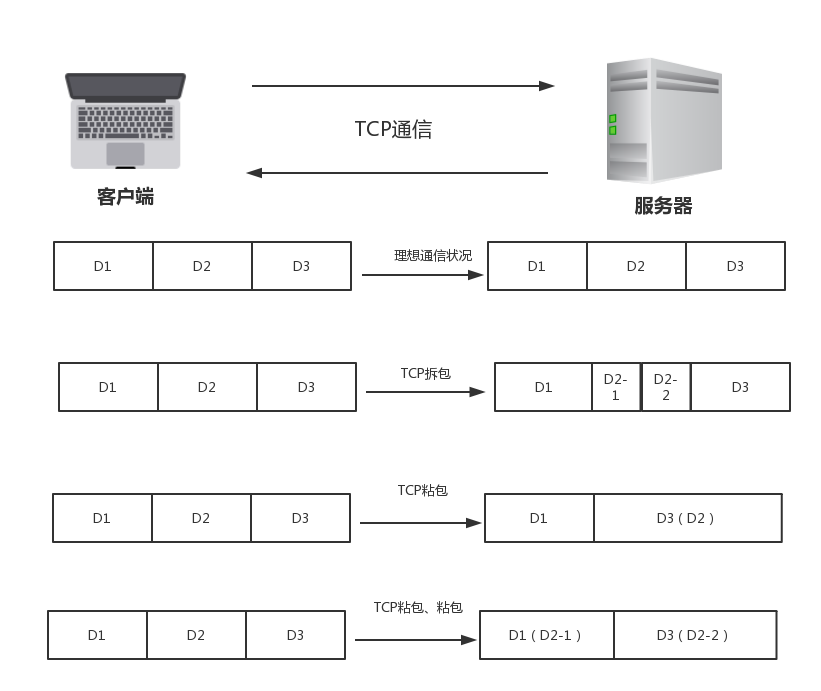Netty sticking and unpacking
1. What is unpacking and sticking
(1) introduction to unpacking and sticking
TCP is a "flow" protocol. The so-called flow is a string of data without boundary. You can think of the running water in the river, which is connected in one piece, and there is no boundary between them. The bottom layer of TCP does not know the specific meaning of the upper layer business data. It will divide the packets according to the actual situation of the TCP buffer. Therefore, in business, it is considered that a complete packet may be split into multiple packets by TCP for sending, and it is also possible to package multiple small packets into one large packet for sending, which is the so-called TCP sticking and unpacking problem.
(2) diagram

(3) code simulation
-
Server
package com.xm.netty.demo02; import java.net.InetSocketAddress; import io.netty.bootstrap.ServerBootstrap; import io.netty.channel.Channel; import io.netty.channel.ChannelFuture; import io.netty.channel.ChannelInitializer; import io.netty.channel.EventLoopGroup; import io.netty.channel.nio.NioEventLoopGroup; import io.netty.channel.socket.nio.NioServerSocketChannel; public class Server { private final int port; public Server(int port) { this.port = port; } public static void main(String[] args) { int port = 8989; try { new Server(port).start(); } catch (InterruptedException e) { // TODO Auto-generated catch block e.printStackTrace(); } } private void start() throws InterruptedException { EventLoopGroup g1 = new NioEventLoopGroup(); EventLoopGroup g2 = new NioEventLoopGroup(); try { ServerBootstrap bootstrap = new ServerBootstrap(); bootstrap .group(g1,g2) .channel(NioServerSocketChannel.class) .localAddress(new InetSocketAddress( port)) .childHandler(new ChannelInitializer() { @Override protected void initChannel(Channel ch) throws Exception { ch.pipeline().addLast(new ServerHandler()); } }); ChannelFuture future = bootstrap.bind().sync(); future.channel().closeFuture().sync(); } finally { g1.shutdownGracefully().sync(); g2.shutdownGracefully().sync(); } } } -
Server handler
package com.xm.netty.demo02; import java.time.LocalDateTime; import java.time.format.DateTimeFormatter; import io.netty.buffer.ByteBuf; import io.netty.buffer.Unpooled; import io.netty.channel.ChannelHandlerAdapter; import io.netty.channel.ChannelHandlerContext; import io.netty.util.CharsetUtil; public class ServerHandler extends ChannelHandlerAdapter { @Override public void channelRead(ChannelHandlerContext ctx, Object msg) throws Exception { ByteBuf in = (ByteBuf) msg; String str = in.toString(CharsetUtil.UTF_8); System.out.println("Server:"+str); str = "Server return--->"+ str; ctx.writeAndFlush(Unpooled.copiedBuffer(str.getBytes())); } @Override public void exceptionCaught(ChannelHandlerContext ctx, Throwable cause) throws Exception { cause.printStackTrace(); ctx.close(); } @Override public void channelActive(ChannelHandlerContext ctx) throws Exception { System.out.println(DateTimeFormatter.ISO_LOCAL_DATE_TIME.format(LocalDateTime.now())+"One client connection!"); } } -
Client client
package com.xm.netty.demo02; import java.time.LocalDateTime; import java.time.format.DateTimeFormatter; import io.netty.bootstrap.Bootstrap; import io.netty.buffer.Unpooled; import io.netty.channel.ChannelFuture; import io.netty.channel.ChannelInitializer; import io.netty.channel.EventLoopGroup; import io.netty.channel.nio.NioEventLoopGroup; import io.netty.channel.socket.SocketChannel; import io.netty.channel.socket.nio.NioSocketChannel; public class Client { private final int port; private final String host; public Client(int port, String host) { this.port = port; this.host = host; } public static void main(String[] args) { String host = "127.0.0.1"; int port = 8989; try { new Client(port, host).start(); } catch (InterruptedException e) { // TODO Auto-generated catch block e.printStackTrace(); } } private void start() throws InterruptedException { EventLoopGroup group = new NioEventLoopGroup(); try { Bootstrap bootstrap = new Bootstrap(); bootstrap .group(group) .channel(NioSocketChannel.class) .remoteAddress(host, port) .handler(new ChannelInitializer<SocketChannel>() { @Override protected void initChannel(SocketChannel ch) throws Exception { ch.pipeline().addLast(new ClientHandler()); } }); ChannelFuture future = bootstrap.connect().sync(); for(int i=10;i<20;i++) { String str = DateTimeFormatter.ISO_LOCAL_DATE_TIME.format(LocalDateTime.now()) + "---- " +i+"<<<"; future.channel().writeAndFlush(Unpooled.copiedBuffer(str.getBytes())); } future.channel().closeFuture().sync(); } finally { group.shutdownGracefully().sync(); } } } -
Client clientandler
package com.xm.netty.demo02; import java.time.LocalDateTime; import java.time.format.DateTimeFormatter; import io.netty.buffer.ByteBuf; import io.netty.buffer.Unpooled; import io.netty.channel.ChannelHandlerAdapter; import io.netty.channel.ChannelHandlerContext; import io.netty.util.CharsetUtil; import io.netty.util.ReferenceCountUtil; public class ClientHandler extends ChannelHandlerAdapter { @Override public void channelRead(ChannelHandlerContext ctx, Object msg) throws Exception { try { ByteBuf in = (ByteBuf) msg; String str = in.toString(CharsetUtil.UTF_8); System.out.println("Client:"+str); } finally { ReferenceCountUtil.release(msg); } } @Override public void exceptionCaught(ChannelHandlerContext ctx, Throwable cause) throws Exception { cause.printStackTrace(); ctx.close(); } @Override public void channelActive(ChannelHandlerContext ctx) throws Exception { System.out.println(DateTimeFormatter.ISO_LOCAL_DATE_TIME.format(LocalDateTime.now())+" Server connected!"); } } -
Add dependency
<project xmlns="http://maven.apache.org/POM/4.0.0" xmlns:xsi="http://www.w3.org/2001/XMLSchema-instance" xsi:schemaLocation="http://maven.apache.org/POM/4.0.0 http://maven.apache.org/xsd/maven-4.0.0.xsd"> <modelVersion>4.0.0</modelVersion> <groupId>com.xm</groupId> <artifactId>netty</artifactId> <version>0.0.1-SNAPSHOT</version> <dependencies> <dependency> <groupId>io.netty</groupId> <artifactId>netty-all</artifactId> <version>5.0.0.Alpha2</version> </dependency> </dependencies> </project> -
Expected results
1) server
2018-10-11T18:37:19.857 One client connection!
Server:2018-10-11T18:37:19.855---- 10<<<
Server:2018-10-11T18:37:20.377---- 11<<<
Server:2018-10-11T18:37:20.877---- 12<<<
Server:2018-10-11T18:37:21.378---- 13<<<
Server:2018-10-11T18:37:21.879---- 14<<<
Server:2018-10-11T18:37:22.379---- 15<<<
Server:2018-10-11T18:37:22.879---- 16<<<
Server:2018-10-11T18:37:23.38---- 17<<<
Server:2018-10-11T18:37:23.881---- 18<<<
Server:2018-10-11T18:37:24.382---- 19<<<
(2) client
2018-10-11T18:37:19.855 connected to the server!
Client: server return -- > 2018-10-11t18:37:19.855 ---- 10<<<
Client: server return -- > 2018-10-11t18:37:20.377 ---- 11<<<
Client: server return -- > 2018-10-11t18:37:20.877 ---- 12<<<
Client: server return -- > 2018-10-11t18:37:21.378 ---- 13<<<
Client: server return -- > 2018-10-11t18:37:21.879 ---- 14<<<
Client: server return -- > 2018-10-11t18:37:22.379 ---- 15<<<
Client: server return -- > 2018-10-11t18:37:22.879 ---- 16<<<
Client: server return -- > 2018-10-11t18:37:23.38 ---- 17<<<
Client: server return -- > 2018-10-11t18:37:23.881 ---- 18<<<
Client: server return -- > 2018-10-11t18:37:24.382 ---- 19<<<
-
Actual results
(1) server
2018-10-11T18:35:40.988 One client connection!
Server:2018-10-11T18:35:40.986---- 10<<<2018-10-11T18:35:41.01---- 11<<<2018-10-11T18:35:41.01---- 12<<<2018-10-11T18:35:41.01---- 13<<<2018-10-11T18:35:41.01---- 14<<<2018-10-11T18:35:41.01---- 15<<<2018-10-11T18:35:41.01---- 16<<<2018-10-11T18:35:41.01---- 17<<<2018-10-11T18:35:41.01---- 18<<<2018-10-11T18:35:41.01---- 19<<<(2) client
2018-10-11T18:35:40.986 Server connected!
Client:Server return--->2018-10-11T18:35:40.986---- 10<<<2018-10-11T18:35:41.01---- 11<<<2018-10-11T18:35:41.01---- 12<<<2018-10-11T18:35:41.01---- 13<<<2018-10-11T18:35:41.01---- 14<<<2018-10-11T18:35:41.01---- 15<<<2018-10-11T18:35:41.01---- 16<<<2018-10-11T18:35:41.01---- 17<<<2018-10-11T18:35:41.01---- 18<<<2018-10-11T18:35:41.01---- 19<<<